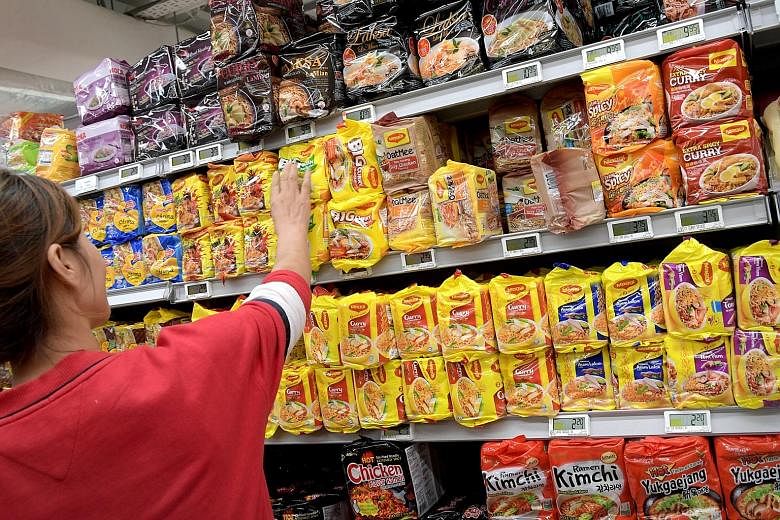In the works: Maggi instant noodles that even doctors may approve of.
Nestle plans to cut the salt content of Maggi products such as noodles, soups, seasonings and stock cubes - including those sold here - by 10 per cent on average by 2020.
The Swiss company announced the changes yesterday as part of a company-wide initiative to reduce sodium, saturated fat and sugar. More vegetables and other nutrient-rich ingredients will be added to Maggi products.
A spokesman for Nestle Singapore said the company has been looking to come up with healthier alternatives, without compromising on taste.
She added that Nestle has been trying to reduce salt in its products since 2005. Since 2013, the company has slashed the sodium content in Maggi 2-Min curry noodles by 31 per cent. "We are also working towards a further reduction of 10 per cent in this product within the next year," said the spokesman.
The move to reduce salt comes amid a rising demand for healthy food products as consumers around the world become increasingly health-conscious.
Experts here said the salt reduction - though small - could significantly benefit people's health.
Dietitian Derrick Ong, founder of Eat Right Nutrition Consultancy, told The Straits Times: "It will have a significant impact, especially for people who eat instant noodles on a regular basis.
"But it also depends on what other food people eat."
About 60 per cent of the salt consumed by Singaporeans comes from table salt and sauces, while processed food, such as bread and instant noodles, makes up about 37 per cent, according to the Health Promotion Board's latest Salt Intake Study, conducted as part of the National Nutrition Survey in 2010.
The study found that the average person consumes 8.3g of salt daily, more than 60 per cent above the recommended level of 5g - or about a teaspoon - a day for adults. Excessive consumption is a risk factor for developing high blood pressure.
A salt intake of 5g is equal to 2,000mg of sodium.
Checks by ST showed that, on average, an 80g serving of Myojo chicken abalone flavour instant noodles had 2,210mg of sodium, while an 86g serving of Nissin chicken flavour instant noodles had 1,930mg of sodium.
A package of Maggi's "extra spicy curry" instant noodles with a 56.5g serving had, on average, 828mg of sodium.
Not all Maggi products flag their sodium content. When asked about this, the Nestle spokesman said it was not mandatory to do so.
Mr Wayne England, head of Nestle's food business, said in a telephone interview with Bloomberg that he expects the Maggi brand's sales to increase as a result of the salt reduction.
But experts here say otherwise.
Professor William Chen, director of Nanyang Technological University's food science and technology programme, said: "It is a good step, but I think the effect on sales would be marginal. People seldom cook at home and, for some of them, even cooking instant noodles is a hassle. More people are going for ready-to-eat food."
Some consumers approved of the move. Others said they were unlikely to change their eating habits.
"I don't treat Maggi noodles as a real meal," said Mr Wong Boon Heng, 48, who works in telecommunications. "It is more like a quick fix if you are really hungry. I think it is still unhealthy, and decreasing the salt doesn't make it less so."
But student Raesmi Nambiar, 19, said: "I think it is a good initiative and a healthier approach, which means that they are listening to customer feedback."

